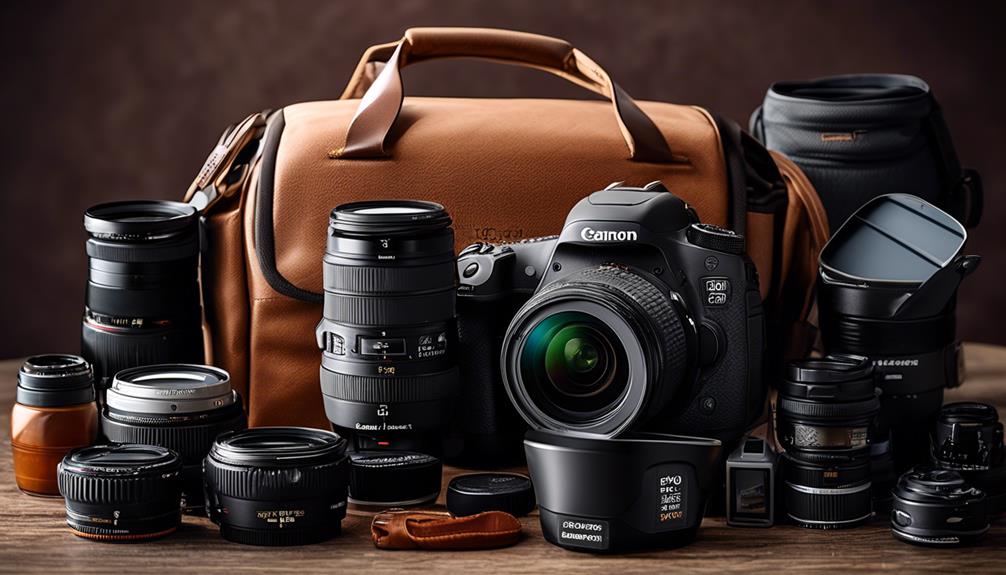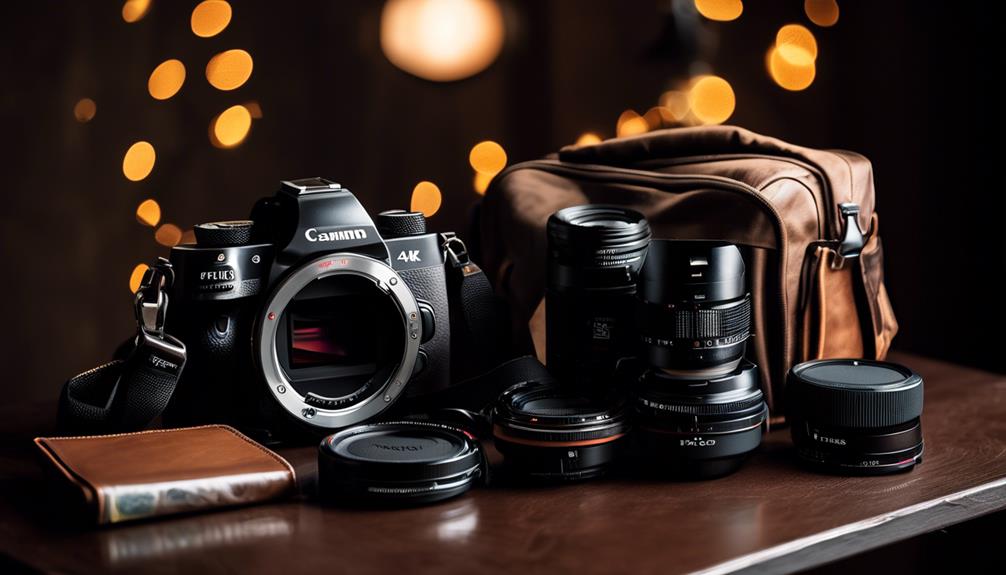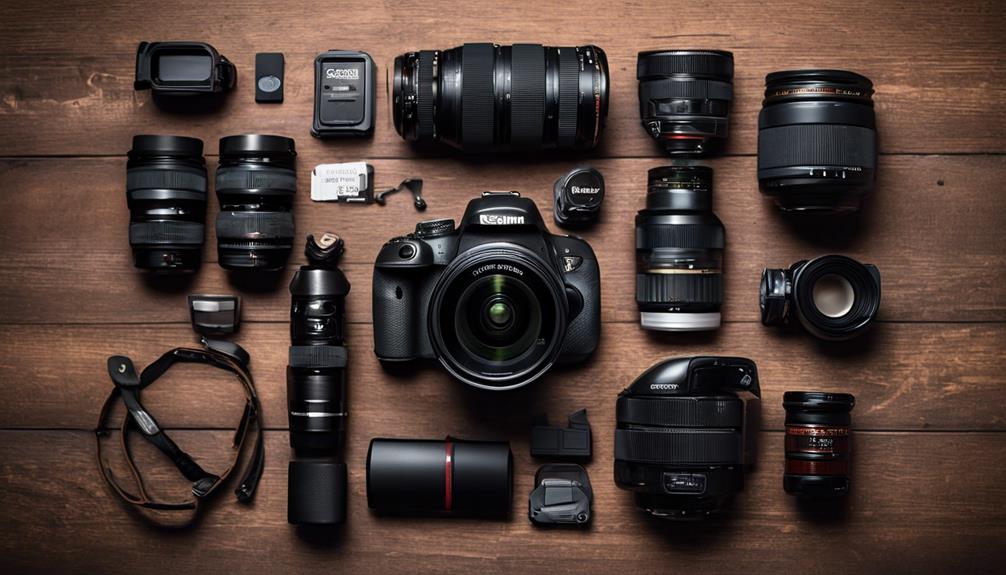Please note this post may contain affiliate links picked by me (Jay) that I have deemed may be of interest or relevant to you the reader of this.
These links do not affect the cost of the thing if you decide to purchase but i may get a little money if you choose to purchase.
For more information on my affiliate link policy click here.
As a passionate photographer, I believe that the path to capturing incredible images begins with the right gear. But where does one even begin? Fear not, fellow shutterbugs, for I am here to shed some light on the essential equipment that beginner photographers should invest in.
From the captivating camera body to the lens that brings your vision to life, we'll explore the must-haves that will elevate your photography game. And that's just the tip of the iceberg!
So, grab your lens cloth and buckle up, because we're about to embark on a journey that will transform the way you see the world through your lens.
Key Takeaways
- A beginner photographer should invest in a camera body with a larger sensor for better image quality and resolution, as well as compatibility with accessories for flexibility in photography styles.
- Prime lenses are recommended for sharpness and low-light performance, while zoom lenses offer versatility in capturing a wide range of subjects.
- Tripods are essential for stability and sharpness in photographs, particularly for landscape photography and long exposures.
- Lighting equipment, such as reflectors and diffusers, is crucial for achieving different lighting effects and creating professional-looking images.
Camera Body
When it comes to investing in gear as a beginner photographer, the camera body is an essential component that sets the foundation for capturing stunning images. As someone who's enthusiastic about photography, I understand the importance of having a reliable and versatile camera body. It isn't just a tool, but a gateway to creativity and innovation in the world of photography.
One of the reasons why the camera body is so crucial is because it determines the overall quality of your images. A high-quality camera body will have a larger sensor, allowing for better image resolution and greater detail. This means that your photos will have more clarity and sharpness, which is essential for creating professional-looking images.
Another aspect to consider when investing in a camera body is its compatibility with camera accessories. As you progress in your photography journey, you'll likely want to experiment with different lenses, filters, and other accessories to enhance your creativity. Having a camera body that's compatible with a wide range of accessories will give you the flexibility to explore different styles and techniques, allowing you to push the boundaries of your creativity.
Additionally, a good camera body will offer a variety of camera settings that allow you to have full control over your images. From manual exposure settings to customizable white balance options, these features will enable you to capture the exact image you envision. This level of control is essential for photographers who desire innovation and want to push their creative boundaries.
Lens Selection
Choosing the right lens is a crucial step in elevating your photography skills and capturing stunning images. As a beginner photographer, investing in the right lens will open up a whole new world of possibilities and give you the ability to capture images with clarity and precision.
Here are a few key points to consider when selecting a lens:
- Lens types and their effects on image quality:
- Prime lenses: These lenses have a fixed focal length, which means they don't zoom. They're known for their sharpness and low-light performance, making them great for portrait photography or capturing detailed shots.
- Zoom lenses: These lenses offer versatility by allowing you to zoom in and out. They're perfect for capturing a wide range of subjects, from landscapes to wildlife. However, keep in mind that zoom lenses may sacrifice some image quality compared to prime lenses.
- Wide-angle lenses: These lenses have a wider field of view, allowing you to capture more in your frame. They're great for landscape photography, architecture, and capturing larger group shots.
Lens accessories for better photography results:
- Filters: Filters can enhance your images by reducing glare, adding contrast, or adjusting the color temperature. Consider investing in a polarizing filter for landscape photography or a neutral density filter for long exposures.
- Lens hoods: Lens hoods help prevent lens flare and protect your lens from scratches. They're essential when shooting in bright sunlight or with strong light sources.
- Lens cleaning kit: Keeping your lens clean is crucial for image quality. Invest in a lens cleaning kit that includes a microfiber cloth, lens cleaning solution, and a blower brush.
Tripod and Stability
Investing in a reliable tripod is essential for ensuring stability and capturing sharp, professional-looking photographs. When it comes to landscape photography, a tripod becomes even more important. It allows you to keep your camera steady, resulting in sharper images with great depth of field.
The importance of a tripod in landscape photography can't be overstated. It allows you to shoot long exposures, which is particularly useful when capturing waterfalls, sunsets, or starry skies. With a tripod, you can also experiment with different compositions and angles without worrying about camera shake. This opens up a world of creative possibilities and helps you achieve those breathtaking landscape shots.
However, there may be situations where carrying a tripod isn't feasible or allowed. In such cases, there are techniques you can employ to achieve stability without a tripod. One technique is to use your surroundings for support. Look for objects like walls, rocks, or tree branches that you can rest your camera on to keep it steady. Another technique is to use your body as a stabilizer. By bracing yourself against a stable surface and holding your breath, you can minimize camera shake and capture sharper images.
While these techniques can be helpful in certain situations, having a tripod is still the best way to ensure stability and get the best possible results in your landscape photography. So, make sure to invest in a reliable tripod that suits your needs and explore the endless possibilities it brings to your photography journey.
Lighting Equipment
To capture stunning photographs and create professional-looking images, it's essential to have the right lighting equipment in your photography gear arsenal. Whether you're shooting indoors or outdoors, the right lighting can make all the difference in the final result.
Here are three key considerations when it comes to lighting equipment:
- Studio vs. natural lighting: Studio lighting provides you with complete control over the lighting conditions, allowing you to manipulate and shape the light to your liking. On the other hand, natural lighting can create a more organic and authentic look, especially when shooting portraits or outdoor scenery. It's important to understand the strengths and limitations of both options and choose the one that best suits your creative vision.
- Importance of reflectors and diffusers: Reflectors and diffusers are essential tools for modifying and controlling light. Reflectors bounce light back onto the subject, helping to fill in shadows and create a more even and flattering light. Diffusers, on the other hand, soften harsh light and reduce glare, resulting in a more pleasing and natural-looking image. These versatile accessories can be used in both studio and outdoor settings, making them a valuable addition to your lighting kit.
Investing in the right lighting equipment is crucial for any aspiring photographer. By understanding the differences between studio and natural lighting and the importance of reflectors and diffusers, you can take your photography to the next level. Experiment with different lighting setups and techniques to bring your creative vision to life and produce truly exceptional images.
Don't underestimate the power of good lighting – it can transform an ordinary photo into a work of art. So go ahead, explore the world of lighting equipment and unlock your full creative potential.
Editing Software
When it comes to elevating your photography to the next level, having the right editing software is an absolute game-changer. Editing software allows you to unleash your creativity and transform your photos into stunning works of art. With a wide array of features and tools at your fingertips, you can enhance the colors, adjust the lighting, and add creative filters to make your images truly stand out.
One of the key features of editing software is the ability to apply creative filters. These filters can give your photos a unique and artistic look, allowing you to experiment with different styles and moods. Whether you want to give your images a vintage feel, a dramatic black and white effect, or a dreamy softness, creative filters can help you achieve the desired result. They allow you to add a personal touch to your photos and make them truly reflect your artistic vision.
Color correction is another crucial aspect of editing software. Sometimes, the colors in your photos may not accurately represent the scene as you remember it. Editing software allows you to adjust the colors, making them more vibrant, balanced, and true to life. You can fine-tune the exposure, adjust the white balance, and enhance the saturation to make your photos pop. With color correction tools, you have the power to transform dull and lifeless images into vibrant and captivating masterpieces.
Investing in editing software is a wise choice for any beginner photographer. It opens up a whole new world of possibilities and allows you to take your photography to new heights. With the ability to apply creative filters and perform color correction, you can unleash your creativity and produce visually stunning images that will leave a lasting impression.
Frequently Asked Questions
How Important Is It for Beginner Photographers to Invest in a High-End Camera Body?
Investing in a high-end camera body is crucial for beginner photographers. The lens quality plays a vital role in capturing stunning images. It allows for better control over focus, depth of field, and overall image quality.
Additionally, investing in camera accessories like tripods, filters, and external flashes can greatly enhance the creative possibilities and versatility of your photography. These investments won't only improve your skills but also enable you to explore new techniques and push the boundaries of your creativity.
Are Prime Lenses or Zoom Lenses More Suitable for Beginner Photographers?
As a beginner photographer, I often wonder if prime lenses or zoom lenses are more suitable for me. Prime lenses offer a fixed focal length, allowing for sharper images and wider apertures, perfect for portraits or low light situations.
On the other hand, zoom lenses provide versatility, allowing me to frame my shots without changing lenses. While both have their pros and cons, I believe that starting with a versatile zoom lens and gradually investing in prime lenses as my skills improve is the way to go.
Do I Need a Tripod if I Mainly Shoot Outdoors During the Day?
Is a tripod necessary for outdoor photography during the day?
Well, let me tell you, a tripod can be a game-changer for outdoor photography, even during the day!
It provides stability and eliminates any unwanted camera shake, ensuring crisp and sharp images.
Plus, it allows you to experiment with long exposure shots and capture stunning motion blur effects.
Should I Invest in Artificial Lighting Equipment if I Mainly Photograph Natural Landscapes?
Investing in artificial lighting equipment can greatly enhance your indoor photography skills.
However, when it comes to capturing natural landscapes, there are plenty of tips and techniques to create stunning images without relying on artificial lighting.
Utilize the golden hours of sunrise and sunset, experiment with different angles and perspectives, and make use of natural light sources like the sun, moon, or even reflections.
With some creativity and practice, you can capture breathtaking natural landscapes without the need for artificial lighting equipment.
What Are Some Alternative Editing Software Options for Beginners on a Tight Budget?
For beginners on a tight budget, there are some great alternative editing software options out there.
Free editing software recommendations include programs like GIMP, Pixlr, and LightZone. These tools offer a range of editing features and can help you enhance your photos without breaking the bank.
Conclusion
As a beginner photographer, investing in the right gear is crucial for honing your skills and creating stunning images.
Choosing a reliable camera body and a versatile lens selection will give you the flexibility to capture various subjects.
Don't forget to invest in a sturdy tripod for stability and lighting equipment to enhance your shots.
Lastly, having editing software will allow you to elevate your photographs to the next level.
Remember, with the right gear in hand, you'll be able to capture breathtaking moments that will leave a lasting impression on your audience.


